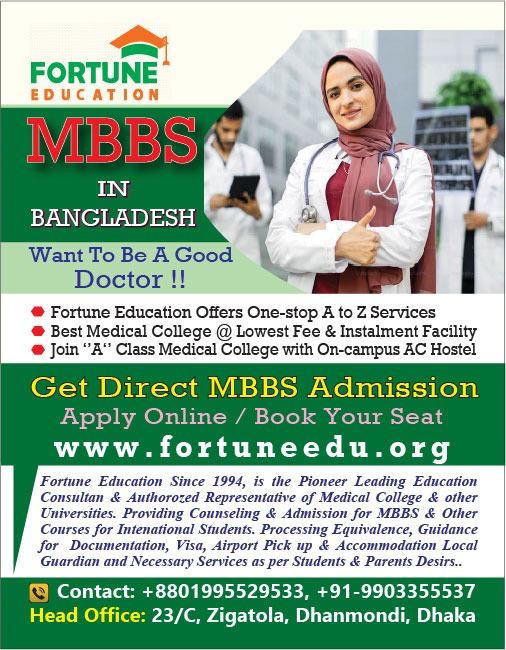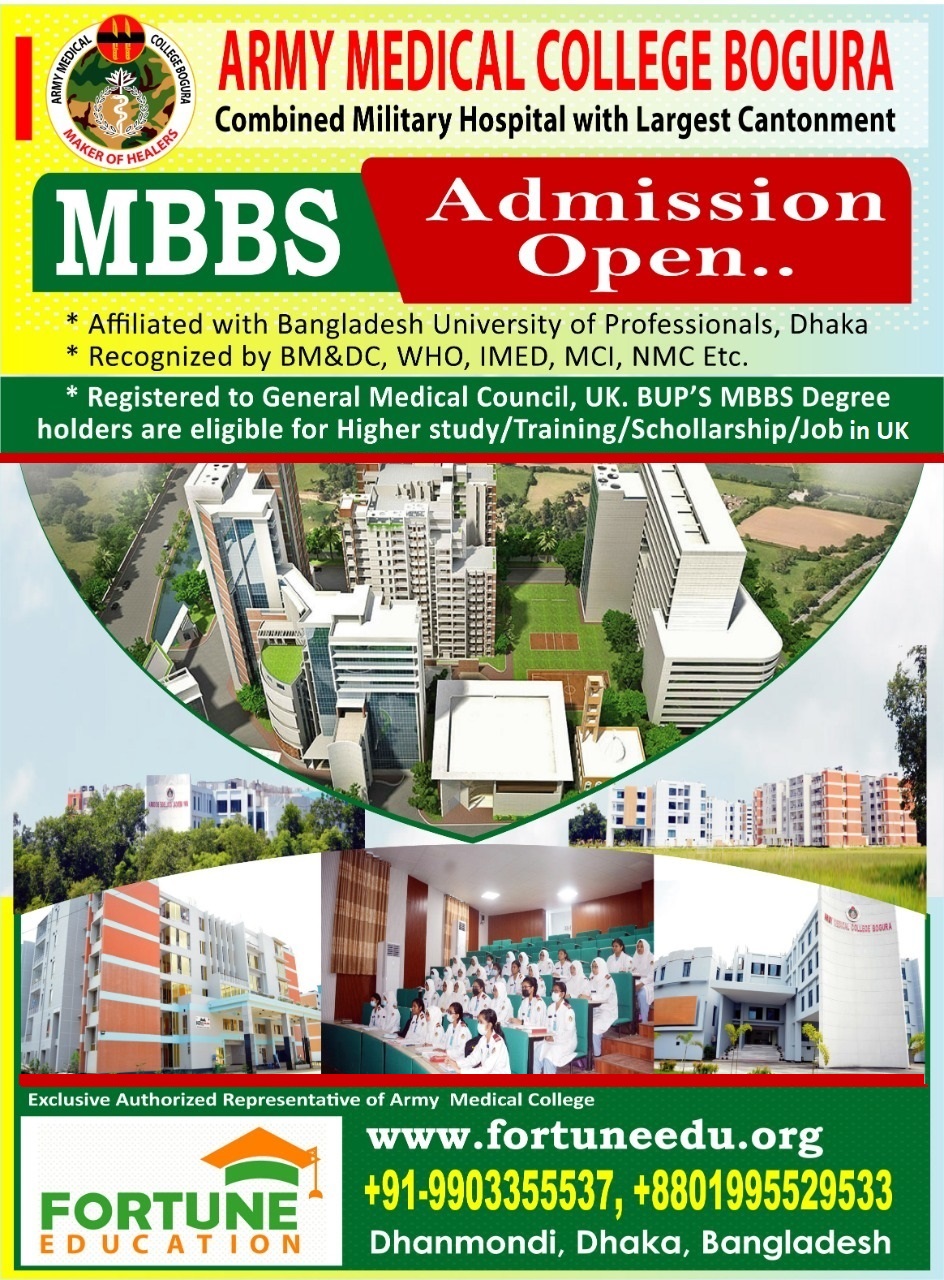MBBS Admission in Pakistan typically involves several key steps and requirements. Here is a general overview:
MBBS Admission in Pakistan
Eligibility Criteria: Applicants must have completed their Higher Secondary School Education (HSSC), often known as FSc (Pre-Medical), with a minimum of 60% marks. Some universities also accept A-levels or equivalent qualifications.
Entrance Examination: Most medical colleges in Pakistan require students to pass an entrance exam. The most common is the Medical and Dental College Admission Test (MDCAT), which is conducted by the Pakistan Medical Commission (PMC). The test assesses knowledge in biology, chemistry, physics, and English.
Application Process: Candidates must apply to the medical colleges of their choice. This typically involves submitting academic transcripts, entrance exam scores, and sometimes letters of recommendation and personal statements.
Merit List and Selection: Admissions are usually based on a combination of secondary school grades and entrance exam scores. Universities publish merit lists of selected candidates based on these criteria.
Interviews and Additional Requirements: Some universities may also conduct interviews or require additional tests as part of their selection process.
Enrollment and Fees: Once selected, students need to enroll in the college and pay the required fees. Fee structures vary depending on whether the institution is public or private.
Foreign Students Admission: For international or overseas Pakistani students, there are reserved seats in many medical colleges. These students may have to meet additional requirements, such as language proficiency tests.
It’s important to note that the specific requirements and processes can vary from one institution to another. Therefore, it’s advisable to check the specific admission guidelines of the colleges you are interested in. Additionally, staying updated with the Pakistan Medical Commission (PMC) announcements and regulations is crucial, as they often update admission policies and entrance exam formats.
MBBS in Pakistan
Studying MBBS (Bachelor of Medicine, Bachelor of Surgery) in Pakistan involves a comprehensive and rigorous medical education program. Here are some key aspects of pursuing an MBBS degree in Pakistan:
Duration: The MBBS program in Pakistan typically spans 5 years. This includes both theoretical study and practical training in various aspects of medicine.
Curriculum: The curriculum is designed to provide a comprehensive understanding of medical sciences. It covers subjects such as anatomy, physiology, biochemistry, pharmacology, pathology, community medicine, and various clinical subjects like surgery, medicine, obstetrics and gynecology, pediatrics, and others.
Clinical Training: Clinical training is a significant part of the MBBS program. Students get hands-on experience in hospitals and clinics, which is essential for practical learning and skill development.
House Job/Internship: After completing the 5-year course, graduates are required to complete a one-year house job or internship. This period is crucial for gaining practical experience in different medical specialties.
Licensing Exam: Graduates must pass a licensing exam conducted by the Pakistan Medical Commission (PMC) to practice as a doctor in Pakistan.
Quality of Education: Pakistan has numerous well-reputed medical colleges, both public and private, that offer quality education in the field of medicine.
Research Opportunities: Many medical colleges in Pakistan also offer opportunities for research in various medical fields, contributing to the overall development of healthcare knowledge and practices.
Cost: The cost of studying MBBS in Pakistan varies. Government or public medical colleges usually have lower fees compared to private medical colleges.
MBBS Admission for International Students
Pakistan also welcomes international students in its medical programs. However, they may have to fulfill additional requirements such as language proficiency tests.
Postgraduate Opportunities: After completing MBBS, there are numerous opportunities for specialization in different areas of medicine through postgraduate programs.
Choosing to study MBBS in Pakistan can be a rewarding decision for those interested in a career in medicine, given the country’s emphasis on quality medical education and practical training. However, it’s important to carefully research and select a medical college that aligns with your academic and professional goals.
Medical Education for International Students
Medical education for international students varies significantly depending on the country and the specific medical school. Here are some general points that international students should consider when looking to study medicine abroad:
Eligibility and Entrance Requirements: International students must meet specific eligibility criteria, which often include having completed pre-medical education with good grades, especially in science subjects. Many medical schools also require standardized test scores (like the MCAT in the United States or the UCAT/BMAT in the UK), language proficiency tests (like IELTS or TOEFL), and sometimes specific entrance exams for international students.
Accreditation and Recognition: Ensure the medical school is accredited and recognized by relevant medical boards and organizations. This is crucial for the validity of your medical degree globally.
Duration and Structure of the Program: Medical programs can vary in length. For example, in the US and Canada, medical education usually follows a ‘4+4 years’ structure (4 years of undergraduate study followed by 4 years of medical school), while in the UK, medical programs can be 5-6 years long.
Curriculum and Clinical Training: The curriculum should provide comprehensive medical education and practical clinical training. Some countries have a more research-oriented approach, while others focus on hands-on clinical skills from early in the program.
Language: The language of instruction is a critical factor. Some countries offer medical courses in English specifically for international students, but in others, you might be required to learn the local language.
Costs and Financial Aid: International medical education can be expensive. Look into the tuition fees, living expenses, and availability of scholarships or financial aid for international students.
Cultural Adaptation: Adapting to a new country’s culture, healthcare system, and education style can be challenging but is an integral part of the international education experience.
Post-Graduation Opportunities: Consider the opportunities for internship, residency, and employment after graduation. Some countries allow international medical graduates to pursue residency and practice locally, while others may have restrictive policies.
Licensing Requirements: Understand the licensing process in the country where you intend to practice after graduation. Some countries require passing a licensing exam or completing additional training.
Global Recognition: Ensure that the degree is globally recognized if you plan to practice in a different country post-graduation.
For specific information, it’s best to research the medical education system and requirements of the particular country you are interested in. Also, reaching out to the embassies, education councils, or the medical schools directly can provide more tailored information.
List of Medical Colleges in Pakistan
Here’s a list of some notable medical colleges in various regions of Pakistan:
Punjab
King Edward Medical University, Lahore
Allama Iqbal Medical College, Lahore
Fatima Jinnah Medical University, Lahore
Punjab Medical College, Faisalabad
Rawalpindi Medical University, Rawalpindi
Nishtar Medical University, Multan
Sindh
Dow University of Health Sciences, Karachi
Aga Khan University, Karachi
Jinnah Sindh Medical University, Karachi
Liaquat University of Medical and Health Sciences, Jamshoro
Karachi Medical & Dental College, Karachi
Khyber Pakhtunkhwa (KPK)
Khyber Medical University, Peshawar
Ayub Medical College, Abbottabad
Khyber Girls Medical College, Peshawar
Saidu Medical College, Swat
Balochistan
Bolan University of Medical and Health Sciences, Quetta
Islamabad (Capital Territory)
Pakistan Institute of Medical Sciences (PIMS), Islamabad
Federal Medical and Dental College, Islamabad
Azad and Kashmir
Azad Jammu Kashmir Medical College, Muzaffarabad
This list is not exhaustive, and there are many more colleges across the country. Additionally, new colleges may have been established, and existing ones might have undergone changes. It’s important to verify the current status, accreditation, and recognition of these colleges from the Pakistan Medical Commission (PMC) or other relevant authorities, especially for up-to-date information regarding international student admissions, curriculum details, and other specific queries.
MBBS Fees Structure in Pakistan
The fee structure for MBBS programs in Pakistan varies significantly depending on whether the medical college is a public (government-run) institution or a private one, here’s a general overview of the MBBS fee structure in Pakistan:
Public Medical Colleges
Tuition Fees: Public or government medical colleges typically charge lower fees. The annual tuition fees can range from approximately PKR 20,000 to PKR 40,000. However, these figures can vary based on the specific college and province.
Other Charges: There may be additional charges for hostel accommodation, laboratory fees, library fees, etc., but these are generally nominal.
Private Medical Colleges
Tuition Fees: Private medical colleges are more expensive. The annual tuition fees can range from approximately PKR 600,000 to PKR 1,200,000 or more.
Other Charges: Additional charges for hostel, laboratory, and other facilities can significantly increase the overall cost.
For International Students
Tuition Fees: The fee structure for international students is generally higher than for local students. It varies widely among institutions.
Currency: International students might need to pay fees in US dollars or another stable currency, which can affect the overall cost due to exchange rates.
Additional Considerations
Annual Increase: Tuition fees may increase annually due to inflation and other economic factors.
Admission and Security Deposits: Some colleges may require a one-time admission fee and a refundable security deposit.
Living Expenses: Living expenses including accommodation, food, transportation, and other personal expenses should also be considered, especially for students coming from other cities or countries.
Scholarships and Financial Aid: Some colleges offer scholarships or financial aid, which can reduce the burden of tuition fees.
It’s important to check the most current fee structure directly from the medical colleges or their official websites.
Additionally, the Pakistan Medical Commission (PMC) or the respective provincial medical authorities can provide relevant information and guidelines regarding fee structures. Keep in mind that the cost of medical education is subject to change and can vary based on various factors including economic conditions and institutional policies.
Why Best Study MBBS in Bangladesh for International Students
MBBS in Bangladesh
Studying MBBS in Bangladesh has become an attractive option for international students, particularly from neighboring countries like India, Nepal, and Pakistan, due to various reasons. Here are some key factors that make Bangladesh a compelling choice for studying MBBS:
Quality of Education: Medical colleges in Bangladesh are known for their high standard of education. The curriculum is comprehensive and similar to many other countries, including India, making it easier for international students to adapt.
WHO and MCI Recognition: Most medical colleges in Bangladesh are recognized by the World Health Organization (WHO) and the Medical Council of India (MCI), ensuring that the degrees are globally recognized and valued.
Affordable Tuition Fees: Compared to many Western countries, the cost of studying MBBS in Bangladesh is relatively lower, making it a financially viable option for international students.
Medium of Instruction: The medium of instruction in most medical colleges in Bangladesh is English, which is beneficial for international students, especially those from countries where English is a significant medium of education.
Cultural Similarity: For students from neighboring countries, the cultural environment in Bangladesh is quite similar to their home countries. This similarity in culture, food, and lifestyle can make it easier for students to adjust to the new environment.
Clinical Exposure: Bangladesh has a high patient flow in hospitals, providing students with good clinical exposure and practical experience, which is crucial for medical education.
No Donation or Capitation Fees: Unlike many private colleges in other countries, medical colleges in Bangladesh do not usually require donation or capitation fees for admissions, making the admission process more transparent and merit-based.
Safety and Hospitality: Bangladesh is generally considered a safe and hospitable country for international students, with a friendly environment in campuses and hostels.
Proximity to Home Countries: For students from nearby countries, Bangladesh is geographically close, reducing travel costs and making it easier to visit home during academic breaks.
FMGE Pass Rate: Graduates from Bangladeshi medical colleges have shown a good track record in clearing the Foreign Medical Graduates Examination (FMGE), necessary for practicing in India and some other countries.
It’s important for students to conduct thorough research and choose accredited and recognized medical colleges. Additionally, understanding the local laws, language, and customs, as well as the specific admission procedures and visa requirements, is crucial before deciding to pursue an MBBS in Bangladesh.
Bangladesh offers free SAARC Quota for SAARC Countries students
Bangladesh offers a special quota for students from SAARC (South Asian Association for Regional Cooperation) countries in its medical and dental colleges. This is commonly known as the “SAARC Quota.” Under this scheme, a certain number of seats are reserved for students from SAARC member countries, which include Afghanistan, Bangladesh, Bhutan, India, Maldives, Nepal, Pakistan, and Sri Lanka. Here are some key points about the SAARC Quota:
Free Tuition: In many cases, students admitted under the SAARC Quota are exempt from paying tuition fees. However, they might still be responsible for other expenses such as accommodation, food, and study materials.
Limited Seats: The number of seats available under the SAARC Quota is limited and varies each year and across different institutions.
Admission Process: Admission under the SAARC Quota is generally merit-based, taking into account the academic performance of the applicants. The specific admission process and requirements can vary by institution.
Eligibility Criteria: Eligibility criteria for these seats typically include academic qualifications (like higher secondary school performance), and sometimes specific eligibility tests or criteria set by the admitting institutions.
Application Procedure: Interested students often have to apply through the respective education ministries or external affairs ministries of their home countries. The nomination process is usually coordinated through diplomatic channels.
Competitive and Prestigious: Given the benefits and limited number of seats, competition for the SAARC Quota can be high, making it a prestigious opportunity for students from SAARC countries.
Cultural Exchange: This quota also serves as a means of cultural exchange and strengthening ties between SAARC nations.
It’s important to note that the availability of free tuition under the SAARC Quota and the specific terms and conditions can vary from year to year and between institutions. Therefore, prospective students should seek the most current information from reliable sources such as the Bangladesh Ministry of Education, respective embassies, or the specific medical colleges they are interested in.
Fortune Education
Fortune Education Offers Online Direct MBBS Admission to Private Medical Colleges
Fortune Education, as described, seems to offer services for online direct MBBS admissions to private medical colleges. Here’s a general overview of what such services might entail, especially for international students:
Admission Facilitation: Organizations like Fortune Education typically facilitate the admission process for students. They provide information about various medical colleges, eligibility criteria, admission procedures, fees, etc., and assist students in completing their applications.
Direct Admission Process: ‘Direct admission’ often implies that students can secure a place in a private medical college without going through the traditional entrance exams or selection processes. This is common in private institutions where certain seats may be allocated for direct admission.
Online Services: Offering online services means that most of the admission process, from initial consultation to application submission, can be done digitally. This is particularly convenient for international students.
Consultancy and Counseling: Such agencies also provide consultancy services, helping students choose the right college based on their preferences, academic background, and financial capability.
Documentation and Visa Assistance: They often assist in preparing and organizing necessary documentation, including academic records, identification documents, and visa applications.
Fees and Charges: Agencies like Fortune Education might charge a fee for their services. It’s important for students to be aware of these charges upfront and understand what services are covered.
Affiliations and Authenticity: Students should verify the authenticity of the agency and its affiliations with medical colleges. It’s crucial to ensure that the colleges being recommended are recognized and accredited by relevant medical education authorities.
Understanding Terms and Conditions: Before proceeding with any direct admission service, students should thoroughly understand the terms and conditions, including refund policies, in case of any changes in their plans.
Regulatory Compliance: Ensure that the admission process complies with the regulations of both the home country of the student and the country where the medical college is located.
Post-Admission Support: Some agencies also offer post-admission support, including assistance in finding accommodation, guidance on local transportation, and orientation to the new environment.
Students considering using such services for MBBS admissions should conduct thorough research and due diligence. It’s advisable to directly contact the medical colleges for information and cross-verify any details provided by the agency. Additionally, consulting with current students or alumni of the medical colleges and reading reviews or testimonials about the agency can provide valuable insights.






